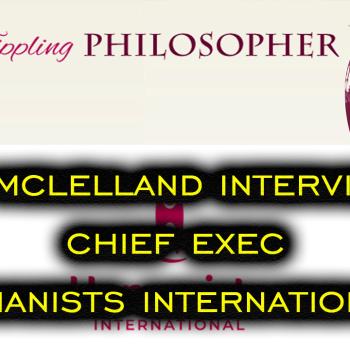Here is an article from a humanist I know who is fairly local to me (who booked me for my talk on the Nativity for the Chichester Humanists), talking about his wedding to his fiancé. I am excited for them both, though there are frustrations with the system in the UK, and the geographical disparities therein.
Will our humanist wedding be meaningful?
By Julian Webb and Claire Berrisford
When you think of getting married, what comes to mind? Is it the scene of a couple saying their vows in front of the people they love? Is it a ceremony filled with small personal touches? Is it the snapshot of confetti and huge grins as the newlyweds celebrate their first steps into married life together? Or is it a ten-minute legal process in an unfamiliar room with a stranger, two witnesses, and cookie-cutter vows?
We are Julian and Claire and we are humanists. Having been in a loving, committed relationship for almost seven years, we got engaged in 2020: a bright spot amid the darkness of the pandemic. Long before then, we had decided that, if we got married, it would be a humanist wedding. This choice has always been important to us; a humanist wedding is a non-religious ceremony that, unlike a civil wedding, is entirely bespoke, which means it can reflect the beliefs and values of the couple.
It didn’t take long for us to decide that we would get married in Bath: a place which holds special memories for both of us. A friend has agreed to conduct the ceremony. We are enjoying the adventure of planning our day – from table names (mythical creatures?) to the colour of the father-of-the-groom’s tie (blue?) – and we can’t wait to bring our families together to celebrate. However, there is still one uncertainty which could drastically change the day: we do not yet know whether humanist marriage will be legally recognised in England by our wedding date.
At present, humanist marriages are legally recognised in Scotland (since 2005), Ireland (since 2012), and Northern Ireland (since 2018), but not in England and Wales. In 2013, the Marriage Act gave the Government order-making powers to give humanist marriages legal recognition. Yet here we are, eight years later, still unable to have the beliefs on which our marriage will be founded recognised in law. Despite good news from the High Court in 2020 – when the judge ruled that the lack of legal recognition of humanist marriage is discriminatory – there has not been any progress since. The situation is currently under review by the Law Commission and the couples involved in the High Court case are considering appealing on the basis that a likely three-year wait to address the discrimination is unacceptable.
It is deeply frustrating that our ability to have a ceremony that is meaningful to us, reflects our values, and is legally recognised is determined by simple geography. Were we to hold the wedding a couple of hundred miles north or west of our chosen location, we would be accorded the legal right that many other faith and belief groups take for granted. As humanists, we have a set of beliefs that we choose to live by. We both feel an obligation to contribute to the people and places around us and we use reason and compassion to guide the choices we make. The importance of life’s big moments is especially precious to us because we believe we only have one life and that every part of it should be savoured. Yet, unlike myriad religious groups, we are discriminated against by our country’s laws and, if the law doesn’t change by our wedding date, we will also have to bear the cost of a separate legal ceremony that says nothing about our values as a couple.
Come autumn 2022, we will get married whether humanist ceremonies are legally recognised or not. We will create a ceremony that reflects who we are and gather together with the people we love. In this, we are truly lucky. So why does it matter whether the ceremony is legally recognised or not? It’s all in the meaning. As humanists, we believe that it’s up to us to create our own meaning in life. At the end of the day, it’s not the flowers, the cake, the guests, or any other of the wedding paraphernalia that really matters. What matters is the ceremony and the pledge that joins two people together.
So, while we have no doubt that, whatever happens, our wedding will be one of our most treasured days, perhaps the greatest gift would be for the ceremony itself to have the true meaning that it promises.
Stay in touch! Like A Tippling Philosopher on Facebook:
You can also buy me a cuppa. Or buy some of my awesome ATP merchandise! Please… It justifies me continuing to do this!









